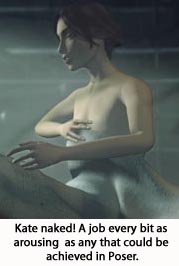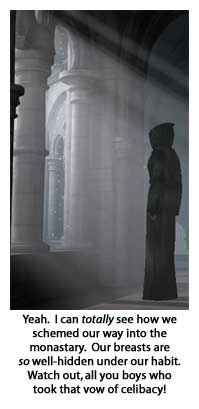| Sam: | | It was with great anticipation that Jacq and I tore off the plastic from Syberia II: No Superfluous Subtitle; it had turned up in the last week I was in Yakutat the first time, and consequently Kate's frost-tousled locks and bedroom eyes had been tormenting me from the CD cover for waaay too long. Imagine, if you will, my hopes and dreams: that all the shit we whined about incessantly on the previous game would be designed out by the miracle of feedback, and that the original's successes would no longer be besmirched by the more awful, wrath-inducing elements. |
| Jacq: | | Your dreams were sort of shattered, darling, but perhaps we should back up a bit. Where to begin? Well, as with our first Kate Walker experience, the first thing that jumps out at you is the aesthetics. The designers of the game truly have an eye for the pretty, and, quite frankly, were it not for the pretty, I'd probably want my money back... particularly since the pretty was quickly overshadowed by a stupid subplot, wherein corporate New York lawyers care about me and want me to come home. To quote you, "Bollocks!" |
| Sam: | | First of all, we weren't going to harp on about Kate's hot polygonal bod, but the game, um, kind of made us. Not only did it have Kate NUDE (sorta), it also had an unmissable example of ass before we even got to the frickin' main menu.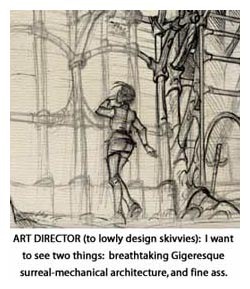 Also, the improved graphics made it kind of abundantly clear that the girl can maintain salon-fresh hair even when deep within the Arctic Circle. Hollywood would be proud. Also, the improved graphics made it kind of abundantly clear that the girl can maintain salon-fresh hair even when deep within the Arctic Circle. Hollywood would be proud. |
| Jacq: | | And we couldn't even hide our hott bod... not even under a habit. |
| Sam: | | God damn, chicks in habits... rowr.Aaanyway. The graphics of the original were really its strongest point, both in terms of theme and execution; they're substantially improved upon in II, with a lot of things becoming crisper. This is apparent pretty much at once. |
| Jacq: | | They still should have gone with actors, as the characters themselves were badly rendered given the fantastic settings, but perhaps that will occur with the release of Syberia III: Get the Hell Back to New York Because I'm Stuck in the Middle of Frickin' Nowhere. |
| Sam: | | Hans in particular isn't flattered by the crisper rendering; he looks kind of sinister.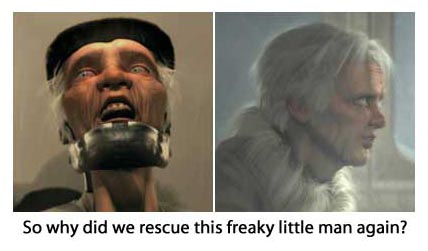 Similarly, the Random Gestures While Speaking engine could have done with some reconsideration - Similarly, the Random Gestures While Speaking engine could have done with some reconsideration - |
| Jacq: | | Yeah, waving our arms about made us look about as attractive as Kermit the Frog. |
| Sam: | | Ahem, yes... and Kate still stumbles and starts and stops in awkward ways when running about. Still, there are some very nice touches; the carriage windows reflect the scenery outside, and we still have those lovely reflecting patches and flying birds and attention to detail, and visuals in cutscenes, documents and normal gameplay complement each other nicely. |
| Jacq: | | For you 'Merkins in the audience, I shall translate: scenery scrolls by while you're looking out the window on the train. And yes, I whole heartedly agree with the attention to detail bit: you can see yourself as you walk through puddles, and your footsteps leave rings in puddles and tracks in snow - tracks that faded with time as more snow fell. Lovely. There were squirrels and wolves and freakish made-up rabbit creatures that wandered the landscape. Fish that randomly jumped in ponds. Snow slid off of roofs. What I think I liked most of all about this sequel was the addition of multiple camera angles during conversational sequences.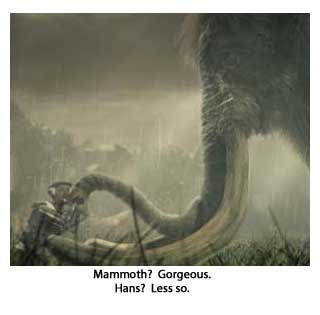 I feel that the rendering of the mammoths is also particularly note-worthy. We've waited two games to see them in the flesh, and their eventual appearance was not a disappointment. I feel that the rendering of the mammoths is also particularly note-worthy. We've waited two games to see them in the flesh, and their eventual appearance was not a disappointment. |
| Sam: | | Once again, though, the designers are a little too fond of their own gorgeous environment, and allowed themselves (once again) vast acres of purposeless space. |
| Jacq: | | Oh God. Understatement of the century. At one point, I couldn't stop myself from keeping track. There was this TOTALLY NECESSARY TO THE PLOT (ha ha right) puzzle with a lemming and some water and tunnels of ice, and well, suffice it to say, you needed to manipulate this stupid lemming with water so it would swim/crawl through an intricate network of ice tunnels to pick berries for you so that you could have a vision quest and save Hans from dying (I am not making this shit up, people), and each time you needed water (which you needed... frequently... because you only had a tiny water flask... particularly if you weren't cheating... though we eventually did) you had to walk through SEVEN pieces of GORGEOUS (well, the first dozen times) scenery. Time from the lemming to the watering hole and back? My best time was two minutes. TWO MINUTES. Now I know how Kate keeps that trim figure. Walking and running all over the place to solve puzzles, the component parts of which are scattered ALL OVER CREATION. |
| Sam: | | The designers, in the tradition of Myst, clearly had a very good idea of the layout of their areas, and - |
| Jacq: | | - though unlike Myst, they didn't give us the true joy of the double click (yes, it still sounds dirty). In Myst, at least in the later sequels, double clicking gave you the option to skip vast chunks of scenery and go straight to the next major locale. Granted, you double clicked at your own peril, because you might miss some extremely obscure hot spot (another thing it shares with Syberia), but at least you had the option. Here, the double click merely makes you, um, saunter. Or scamper. Or something. I wouldn't call it a run. |
| Sam: | | And they didn't always convey the understanding of said areas very well to you; the Youkol Village was particularly bad at this. After a few passes, you could work out the relationship of scenes to each other, but initially things tended to be somewhat disorienting - and not just as a reflection of being new to the place, but rather in the sense of being unsure of spatial relationships between the present scene and the one you'd just come from, even in situations where this should have been abundantly obvious to the protagonist - because, for instance, she was walking around in open space in clear eyeshot of the relevant areas. |
| Jacq: | | Are you trying to say that we were actually supposed to understand things in every scene in the Youkol Village? |
| Sam: | | Um, well, we'll get to the gaping flaws in that little society later. |
| Jacq: | | Tuk-tut. |
| Sam: | | Plot-wise, the game is much like the original: you travel a bit, you stop somewhere, you have to get moving again and must overcome innumerable obstacles (of varying degrees of spuriousness) in order to do so. There's a motivation change, though you'd hardly know it; in the original you were chasing after Hans Voralberg, whose influence could be seen everywhere despite his absence. Hans being found, your aim in the sequel is to actually get to the Syberia of the title. You still encounter evidence of Hans' influence everywhere, but don't expect the little bugger to actually help you interpret any of it. |
| Jacq: | | I'll say his influence is everywhere. Even in places where he's never even been. Explain to me how we should be picking up and using Voralberg keys in Syberia proper, when it's Hans' life dream to get there and this is his first visit. Nevermind, that was rhetorical... |
| Sam: | | It's not a Voralberg key, it just looks exactly like one despite the key design predating Hans and any family interest in mammoths, Syberia or anything remotely connected. |
| Jacq: | | Um, yeah. Rhetorical. |
| Sam: | | But there are Fiendish Plot Twists! |
| Jacq: | | Indeed. |
| Sam: | | Given that the previous game lacked a consistent villain - |
| Jacq: | | Well, there was our boyfriend. |
| Sam: | | - yeah. We don't have him calling us any more, thank christ, but this leaves us with a big hole in the game's structure. No villain, no nagging boss incessantly calling us (thank god, there were far fewer Annoying Telephone Cut Scenes in this game, though somehow New York managed to get through to us despite total absence of mobile coverage). So, in order to provide some Narrative Dynamism, we introduce two exciting new subplots: the Corporate Private Dick and the Scheming Evil Russians, both of whom pursue Kate for reasons about as flimsy as Hans' immune system. |
| Jacq: | | Stupid bastard getting sick was the source of how many tedious puzzles? Anyway, yeah. I could have done with a little less in the way of Narrative Dynamism, thankyouverymuch. |
| Sam: | | The Private Dick never actually influences Kate's progress in any way whatsoever, but the Scheming Evil Russians (who exemplify the general rules that every character except Kate is represented in a very cartoony style, and that everybody refers to Kate by her full name) kind of get in your way. A lot. |
| Jacq: | | Yeah, but the Primary Evil Russian Phil Collins Wannabe gets his in the end. (Yay.) But perhaps I'm jumping the gun. |
| Sam: | | More additional characters include a cute little orphan moppet, who thankfully doesn't join you on your travels, and a cute obese wide-eyed fluffy animal completely made up, as if by a Disney studio decision, for the sole purpose of being annoying. Who unfortunately does join us on our travels.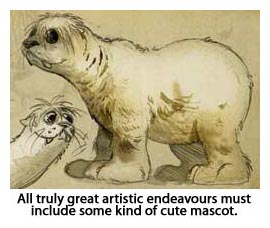 |
| Jacq: | | Truly. Why create a youki, when marmots proliferate across the great white North? Heck, it doesn't even matter if marmots are indigenous to the northlands. After all, it seems penguins can exist in the most unlikely of places. |
| Sam: | | Ah. Yes. I'm not exactly sure how this idea got past the betatesters or even the drawing board. There were penguins. Quite big ones. Deep in the Arctic Ocean. They exhibited some rather odd behaviour patterns, too. |
| Jacq: | | (Snicker.) |
| Sam: | | What? |
| Jacq: | | Nothing. Do continue. |
| Sam: | | Like how there appear to be several thousand of them all guarding one egg, and how they form gangs and tear to pieces anyone who attempts to steal said eggs. And, um, how they appear in the Arctic*.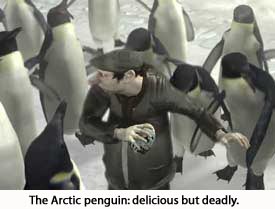 |
| Jacq: | | (The park ranger does NOT approve.) |
| Sam: | | The park ranger equally disapproved of the Bear Puzzle. It's an element of the closely-guarded park ranger bear know-how that the way to deal with bears is not to throw them salmon. Particularly not to throw them dozens of salmon until you find one of the right colour. |
| Jacq: | | True. And really, if I wanted to watch Kate Walker - or anyone, for that matter - fish, I wouldn't have cancelled my satellite subscription to The Outdoor Network. Though I had a problem with The Interminable Salmon Puzzle before it even began. What bear attacks a cabin that's obviously been empty for a very long time? Again, rhetorical. At any rate, this makes for a great segue to talk about the Awesome Puzzles that were such a constant throughout Syberia II. |
| Sam: | | Now, in the previous game there were quite a few dodgy puzzles, though the IF convention of sticking a random complicated machine in the middle of your scenery was at least justified. However, quite a few of them were consistent with pacing and environment and actually added to the game. Here the designers were clearly getting a little desperate for puzzles, and just about every puzzle cliche comes up - a music puzzle, a hotspot-maze, a puzzle involving constellations, a codewheel puzzle or two, a puzzle where you have to focus the light-beam to find a secret, a fishing puzzle, a map-coordinates puzzle, and a candy-machine puzzle that screamed 'soup cans'. |
| Jacq: | | In the spirit of Syberia I there were (not one but) two obscure bird puzzles. And let's not forget the lemmingade puzzle. |
| Sam: | | A puzzle, incidentally, that like several in this game fails one of the big design requirements of a decent puzzle: it should not present an incredibly obvious and sensible way to solve it, not allow that solution, and offer no good reason why you can't take it. So, instead of just smashing the ice-so-thin-it's-transparent with a shoe or something, you have to go through this stupidly complex hamster-tunnel puzzle in total linearity. |
| Jacq: | | Oh, but Sam, dear, without the puzzles it would just be one big animated movie! |
| Sam: | | Syberia II: An Interactive Jog. Really though, I continue to be amazed at how inferior the design of a well-funded mainstream adventure game is to so much IF written by individual amateurs in their spare frickin' time. |
| Jacq: | | Now's probably the best time for admitting how many times we were forced to cheat. Last time we were forced to utilize hints on three occasions. This time, five. I must admit, however, that I felt vindicated when, in looking up the hints for one puzzle, the response from UHS was, and I quote, "This is complicated, and there are no particular hints as to how to get it to work."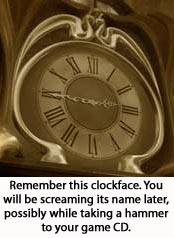 |
| Sam: | | After buggering about with art restoration and aromatherapy for half a weekend, we considered ourselves justified. |
| Jacq: | | Quite. |
| Sam: | | Similarly, there's an abundance of Game Illogic, both in practical matters (the ever-burning torches in the ice cave that never melt anything, the water in the narrow ice tunnel that never freezes, the cosmonaut from the previous game who randomly crashes in the exact same wilderness spot you're stuck in) and in Plot Advancement. Here's an example, shouted to Jacq as she prepared another much-needed set of drinks in the kitchen:ME (all out of options): Oh, let's just see if some person hasn't randomly appeared down this previously useless side-path...(...FIVE SECONDS ELAPSE...)ME: Guess what? |
| Jacq: | | I should comment that, while writing this review, as with our last review, we've been consuming a fair 'mount of ... how do I say it? |
| Sam: | | booze! |
| Jacq: | | Um, yes. And Sam has just created a new drink, consisting of dark rum, triple sec, grenadine, lime juice, perrier and unmeltable ice. |
| Sam: | | I call it a "Kate Walker." |
| Jacq: | | Right. At any rate, enough with bitching about puzzles. |
| Sam: | | Waitwaitwait. Thing is, throughout the first piece you built up a picture of Hans' personality, partly through the accounts of others but mostly through his automatons and complicated machines. The guy is clearly an inveterate puzzlehead, and also has great aesthetic sensibility, and so on. The actual character is kind of a disappointment, but the real let-down is that we see precisely the same type of puzzle-machine in Syberia proper - which detracts deeply from this reading of the development of Hans, since it makes it pretty explicit that the game only has puzzles because games need puzzles, rather than it being a nicely literary way of explaining the guy's character. |
| Jacq: | | WE ARE MOVING ON. |
| Sam: | | meep! |
| Jacq: | | Now's as good a time as any to pick on both you and the game. As you speak to characters in this game, playing the game of Exhaust the Conversation Topics, conversation topics disappear. As you cover a topic, it vanishes. For-ev-ar. At first I thought this to be good, but it means you can't revisit topics. This is a pain in the ass when the other person with whom you're playing is LOUDLY MOCKING DIALOGUE AND ACCENTS and you kind of miss key information for solving the aforementioned obscure shitty puzzles. |
| Sam: | | But the mocking. Really. They didn't improve on the voice acting in this one little bit. English comprehension is near-universal. |
| Jacq: | | Got to appreciate their command of the language - I was quite pleased to finally hear someone call her 'Street Walker.' Oh! The pain! How horrible! Snrk. |
| Sam: | | Rustic Russians use American idioms like 'folks' and 'dang' with immaculate diction, if anything in that dreadful fake accent can be immaculate. The Youkol race only have one phrase in their entire language: 'Kuruk-ma. Tuk-tut.' Which kind of, um, brings me to the superb characterisation of far-northern Russian tribes that the Youkols are. They're this sort of unholy breed between pre-Christian Finno-Ugrics and Inuit and, um, whoever the hell has dream-catchers. |
| Jacq: | | I've Googled. Admittedly, I thought it was Cherokee, but it seems to be the Chippewa. In either case, it sure as hell ain't Inupiat, or Youkol, or whatever arctic tribe it is that lives with penguins. |
| Sam: | | At least the drums and the hallucinogens were vaguely in the same region - but, um, youkis? 'Related to both seals and bears and also possibly dogs'? What the fuck? Anyway, the Youkols are dying out and turning into alcoholics and having their culture shat on by orthodox Christianity, so it must be an accurate depiction 'cause all tribes north of a certain latitude are like that. |
| Jacq: | | Good God. Don't get me started on the stereotypical ethnic 'Arctic' peoples (the presentation of which is really quite patronizing), nor the implicit sexism of Christianity. The game designers, in this go 'round, decided to make profound statements as to how the benevolence of Christianity is not available to all. If you're a hott chyk with an ass that looks good in a habit, forgetaboutit. |
| Sam: | | Um, I think that might just be Orthodox Russian Christianity, which, let's be quite frank, is for all its failings a damn sight better than Catholicism. But I digress. In any case, the monastery was one of the most beautiful parts of the game; the bell-ringing sequence had the nice dramatic effect of making the player pause and look up in admiration just as the characters onscreen do. That said, there was a talk option with monks that just revealed said monks to have taken a vow of silence. But I consider that to be compensated for by Kate's comment on a grave-digging monk: 'Whiling away those celibate hours.'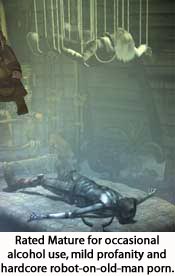 |
| Jacq: | | This is perhaps the most opportune moment to interject that the dialogue for the obsessive-compulsive cleanfreaky monk who randomly shouted bad Latin phrases at us was obviously written using not one, but many, latin phrase dictionaries. I think that at one point he actually said... what was it? |
| Sam: | | Pim pis pit, pimus pistis pants? Sadly I doubt it. |
| Jacq: | | Riiight. Back on track.Themes, setting, and plot. We see the continuation of themes that were prevalent in Syberia I: decaying landscapes, forgotten people, personal growth, and pursuit of a life's dream. |
| Sam: | | Hmm. The personal-growth thing has a little less direction than it did in the original, I think, because Kate has really little to do except stick to the resoluteness she developed during the first half. She doesn't really overcome anything vastly more problematic than she did previously, new villains or not. |
| Jacq: | | I suppose I would agree that there's not a vast amount of further development, but there is a continuation of the theme. Kate stays the course, despite being asked to return to the world she left behind on several occasions. And she seemed a little less prone to being jerked about this go 'round. Had you not played the first Syberia and followed Kate through this transition then you probably wouldn't recognize it as a theme, and in that respect it's weak, but it is there. |
| Sam: | | It felt weak to me mostly because it would have made much more sense to just eliminate the New York stuff entirely after Kate's climactic decision at the end of the first game. They spend so much time building up the pursuit in this one, but it never feels threatening - the decision has been emphatically made, Kate never doubts it, so what's the guy going to do even if he does catch us? - and it's ultimately abandoned. Massive waste of time.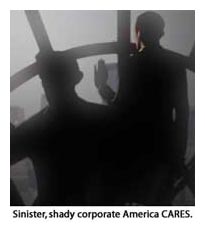 |
| Jacq: | | I wouldn't say that the New York private dick bit is superfluous... I mean, our family is worried, they're blaming the law firm and threatening to sue, a very realistic progression of events - not that the execution of the events was done well, but it needed to be addressed on some level. It would seem unrealistic to think that our mother would simply write us off and forget about it, but, well, I wish we'd just mysteriously and finally gone out of cell coverage. That would have been realistic.And I would also argue that Kate sort of does doubt her decision. She never says it in so many words, but we see it in her face when she's mulling over whether or not to answer the phone, when she knows that her past life is on the other end of the connection. |
| Sam: | | Mrf. This game doesn't really care about realistic concerns too much -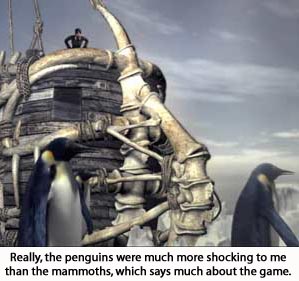 - which is well and good, but it does mean you can't use realism to justify what's basically a massive dramatic fuck-up. And Kate's character isn't really deeply constructed enough for hesitation to have much import; something that would, I must confess, have been much more likely to be remedied by actors rather than CGI. (Still can't see how you'd have put them into the gorgeous CGI backdrop, which is the game's main point). - which is well and good, but it does mean you can't use realism to justify what's basically a massive dramatic fuck-up. And Kate's character isn't really deeply constructed enough for hesitation to have much import; something that would, I must confess, have been much more likely to be remedied by actors rather than CGI. (Still can't see how you'd have put them into the gorgeous CGI backdrop, which is the game's main point). |
| Jacq: | | Yes, I found myself disappointed with Kate's character when all was said and done. We have the conclusion of every major bit of plot aside from Kate, really - the train hits the end of the line, Oscar fulfils his ultimate purpose, Hans sees the mammoths of which he's dreamed - and then we have Kate, standing there alone, watching Hans ride off into the sunset rain. At the end of the anticipated (though unexpectedly brief) climax, I spent a few moments wondering what happened to Kate. She's alone in the wilderness with no way to return to anywhere, and she's quite obviously incapable of sewing mammoth skins or hunting youkis, so what's she going to do? Why didn't they wrap that up? Was it intentional? Would there be another sequel? Then I realized that she's really not worth tying up even as loose end. |
| Sam: | | Cough cough, ahem, I wouldn't necessarily agree.However, in the sense you meant you're right. Kate's character could arguably be read as an intentionally blank POV Everyman, and in terms of her dramatic purpose that's precisely what she is, but if that's your intention you don't make your protagonist's doe-eyed face the only thing on the box, or repeat her name endlessly in every conversation, or have laboured clothes-changes and hordes of reaction shots. Kate's just deeply sketched enough to be shallow; to me it smells like an attempt to produce another Lara Croft. |
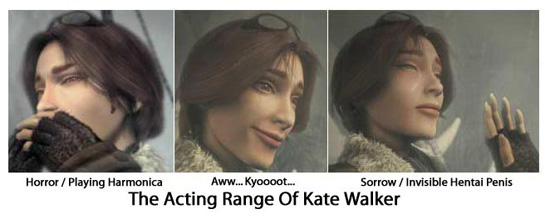 |
| Jacq: | | If so, I think the attempt falls flat. Once we remove the plot around her, there's nothing of particular interest left. |
| Sam: | | Precisely. Kate never acts on any motivations except for those given to her, whether by her boss or Hans or just the scripted chain of events. In this sense she's either a weak personality or an intentional everyman to usher us through the piece; and neither interpretation works too well, which smells of design failure one way or another. The loose string of Kate's inability to return is paradigmatic of this: although Kate's fulfilled her narrative purpose (and the story can hardly go anywhere from its ending), she's concrete enough for it to make little sense to see her as a purely blank character. |
| Jacq: | | We had a discussion recently where you put forth the idea of how the game would have been different had Kate Walker's character been a man. First off, allow me to point out the obvious: a man in tight pants would never be respected as a character, whereas a man in respectable trousers would deny us the glory of the well-rounded buttock. Either way, you lose something.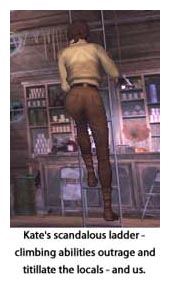 But there's more to it than that. But there's more to it than that. |
| Sam: | | Yeah; if the hero was male, he'd have been identified as a weak non-hero fairly early on, and there's not really enough traditional male-hero material in the development to raise him above that. Even at the end, Kate gets told what to do near-constantly; she can get away with being initially indecisive more easily than a man could have, and doesn't need to achieve as much to be seen to have Grown As A Person. To be fair, I don't think the adventure-game style is very condusive to straight-up traditional male heroes; I can't really think of any convincing ones in the genre. |
| Jacq: | | I'm glad you finally qualified that with 'straight-up traditional male heroes' as opposed to simply 'male characters.' A man could have taken the place of Kate Walker, but one of the major supblots of the first half of this series would have been completely different had that been the case. That, and at the end I'd be less worried about poor ickle city-girl Kate being abandoned in the great big scary wilderness.Hm... you know... now I'm wondering if there was an ending we missed. Perhaps there's an ending that accounts for both Kate and Hans. Maga, load up the game from our final save position, please! |
| [... click click click do the final puzzle another way click click click...] |
| Sam: | | ...and, to our complete lack of surprise, there wasn't. |
| Jacq: | | Linear to the very end of that line. Bah. I think that, at least for me, that pretty much covers it. About the only thing I've not mentioned is that I was once again pleased with the musical score. It was a bit redundant at times, but never gratingly so, and while it never stood on its own to the point where I'd want to purchase a soundtrack, the music did appropriately add to setting and mood quite often. I think that, like the visual aspect of the game, Syberia deserves points in this category as well. |
| Sam: | | Though by no means to the same extent. Like everything else in the entire fucking game, it's only there to supplement the visuals. |
| Jacq: | | True. But good music in a movie or game is always that way. If it stands on its own, it's overdone. But perhaps that's just me. But we digress. |
| Sam: | | Really, all this slagging-off isn't totally merited - the non-visual elements weren't dire (with a few notable exceptions), merely mediocre. But the visuals throw 'em into contrast. I'm kind of pissed off that all this beautiful work was tossed away for want of decent foundations. |
| Jacq: | | That's pretty much my take as well. An extraordinarily well-crafted world, at least visually speaking, one in which I was happy to move and explore, but the characters lacked proper depth, the plot often failed to provide the necessary drive, themes were beaten to death, and puzzles actually detracted from the flow - they rarely seemed seemless with the plot and appeared, in my opinion, to be tedious speed bumps placed in such a way as to merely prolong the enevitable conclusion to our journey. |
| Sam: | | Yeah. Big DramaticFuck-Up Number Five Billion and Two: No Significant Plot Twists. We knew we were going to Syberia, and we got there. |
| Jacq: | | There were plot twists, to be fair, but nothing significant. Nothing that mattered. The plot twists that did appear felt just like many of the puzzles: they were speed bumps. They added little or nothing to the experience, except in terms of exasperation, eye rolling, and our use of the phrases, "Please!" and "Spare us!"Seems like it's time to wrap things up. My overall verdict? I enjoyed it, but it wasn't as good as its predecessor, and isn't one of the better graphic adventures I've played. |
| Sam: | | Yeah. This time around, it looked like Savoir Faire on steroids and played like A Crimson Spring. |
| Jacq: | | If you're still reading, I think it's time you made yourself a drink. You've earned it. |







